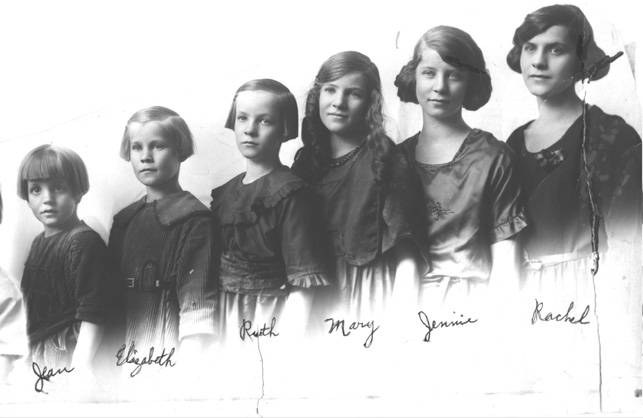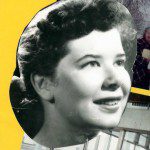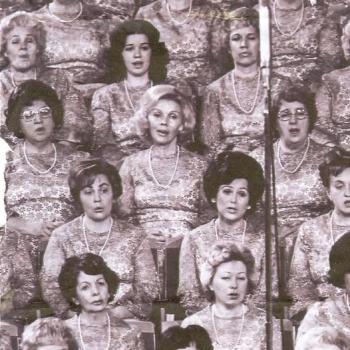These are among the final words written by my great grandmother, Alsina Elizabeth Brimhall Holbrook:
Dearest Children, Grandchildren, Great Grandchildren and more—
Be true to your faith, live the Gospel and remember the Lord never requires anything of you that He does not prepare a means whereby you can accomplish it. The art of glorious living here and throughout all eternity is within your reach. . .
Your needs will be of great concern to us. If we have power to help put your petitions over, we will not fail. Present them to the Father morning and night in your families and many times in secret through the day. What is wisdom in the Father will be granted you and what is not will be supplanted by a peace in your hearts.
Goodbye for a little while.Mother and Father
With gratitude for the privilege
Looking down at her posterity from that “sad height” of old age (I, the first great granddaughter, was five years old) she considered her motherhood a privilege.
She had lost three children by the time of her death. Seven-year-old Jean was killed when the log overhead bar of a swing set fell on her head. Jean lived for another six months, and one day asked her mother to rock her to sleep. Though Grandma Alsina was busy, she rocked her daughter, who died shortly thereafter.
Seventeen-year-old Blaine, who had suffered a head trauma (we know there was some disability), died at age seventeen.
Rachel, age forty-two, died of a stroke during a pregnancy.

When little Jean died, my great grandmother rode in a carriage with her father, George H. Brimhall, and wept with him. He counseled and blessed her. But in 1932, suffering from depression which had plagued him for much of his life, George H. shot and killed himself. Such was an agony Alsina could not have prepared for.
His depression might well have started when his first wife, Alsina Wilkins Brimhall, went mad after the birth of her fifth child and was institutionalized for the rest of her life. The doctors of the day called it “brain fever,” but it sounds like post-partum psychosis. In the story, as presented to me in my childhood, George H. blessed his wife to remain on earth. According to my great-grandmother’s journal, he “blamed himself” for the tragic conditions she endured for the next forty-one years. Her journal continues with a poignant memory:
I remember well, when we were children, we were called to our mother’s bedside. . . . Father lay on the side of the bed by mother. His face was flushed and careworn. He had been advised for her best good, care and protection, to take her to the State Hospital for treatments. This he did. . . .
Years later, George H. wrote this:
If I could make but just one wish
And it would granted be
If I could make a single gift
A-top my Christmas tree,
I would not ask for wealth;
And though I am in quest of it
I would not ask for health.
There suffers yet another
Dearer than life to me;
Darling wife-a mother
I’d ask that she be free
To share my pleasures,
Drink deep of all my joys;
And with these other treasures
Our grown-up girls and boys.
This story of my great great grandmother haunted me. Eventually I wrote this poem about it, published in Sunstone, March 1985:
BEFORE THE YEARS SHE SPENT INSANE
George had had Alsina for
But few years when their fifth was born.
Their love was sealed with years of days
And nights beneath the quilt she’d made.
The white and yellow pillowslips,
The laced crocheted embroidery
Were threads that tied the time to her
And witnessed all the angel-love
That could not be contained within
The fragile vessel that she was
And so, flowed into crewel blooms —
(Little lilacs on the sheets.)
Their fifth had brought brain fever.
He held her pulsing hands in his
And rubbed her fingers in his palms.
Her cheeks were Winter’s early flowers:
Poinsettias bright on snowy banks;
The lines around her mouth and eyes
Impious tracks through virgin snow
Unjustly dark, unjustly deep.
Her eyes, half-open, stared at him.
Her little mouth stuck to her teeth.
He moved his hands to touch her hair
And let his fingers press her head.
He thought about the Priesthood pose,
The way and words to bless, to heal . . .
He kissed her dark and gleaming strands.
“I have the power to call on God,”
He whispered to her needlepoint.
“I’ll use my strength to make you well.
Lord knows I’ll wilt without you here.”
Her breaths were loud, laborious.
“I’ll never be the same,” she said.
“Oh, George, my love, please let me go.”
He held her close and breathed, “I can’t.”
Alsina turned her head away.
And when George laid her down again,
She cried and stained the pillowslips,
The threads that tied her down.
I wonder what paradoxes Alsina Elizabeth confronted when contemplating her own motherhood. Was she concerned that she might suffer her mother’s illness? That she might battle depression like her father? We have no hint of anything but her faith and her gratitude. Looking through time from her last days on Earth, she thanks all of us in her posterity—myself included—for “the privilege.”
Alsina Elizabeth Brimhall teaches me that at the end of our lives, we will see only the peak moments, and most will have revealed their miraculous components—or sometimes their dangerous ones.
When my great grandmother wrote “with gratitude for the privilege,” she knew that her position as the matriarch of her family was magnificent—not to be diminished by the errors of her children, grandchildren, or by the sufferings of either her ancestry or her posterity. All of it, ALL of it was to be celebrated as a chain of individual journeys connected by our common DNA, our family, our community, our history, our future. She considered that she had been serving Christ as she served her disabled son. Her grief over her losses had been gentled by the joys of other events and by the passage of time. She describes “glorious living” as an art. I like that: the creative art of living within paradox and yet discerning joy; of enduring pain and trusting in relief; of bridging sorrow to promise, and anticipating an eternity of growth where even we can whisper comfort through the generations.













